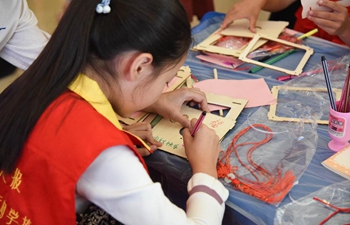
Sadia Ibrahim receives medical treatment at an anti-malnutrition treating center in Al-Sabeen hospital in Sanaa, Yemen, on Sept. 12, 2019. Sadia Ibrahim facepalmed herself feeling dizzy after the doctor diagnosed her as "skin and bones." The 11-year-old severely malnourished girl now weighs around 12 kg. She lies on a bed in Al-Sabeen hospital in Yemen's capital Sanaa to receive treatment as doctors and her poor parents are trying to rescue her life. (Photo by Mohammed Mohammed/Xinhua)
by Mohammed Mohammed
SANAA, Sept. 14 (Xinhua) -- Sadia Ibrahim facepalmed herself feeling dizzy after the doctor diagnosed her as "skin and bones."
The 11-year-old severely malnourished girl now weighs around 12 kg. She lies on a bed in Al-Sabeen hospital in Yemen's capital Sanaa to receive treatment as doctors and her poor parents are trying to rescue her life.
"Sadia arrived here three days ago with an acute malnutrition, and now she receives medical treatment," said Fouad al-Raimi, a doctor at the malnutrition ward, which is full of malnourished children.
"Sadia weighed 12 kg when she arrived, now her weight is 12.6 kg. We placed her under medical care for several days to get better," the doctor added.
Sadia is one of the lucky girls who were moved to the hospital for treatment, as thousands of families in remote villages are not able to afford taxi fares or pay for treatment.
Sadia is very weak and barely can raise her hand to touch her pretty hair when feeling dizzy. Her mother brought her this week from a village at al-Hada district in Dhamar province, some 100 km south of Sanaa, after her health condition worsened.
"We were about to lose her," the mother said as sadness appeared weighing down upon her shoulders while seeing her daughter on the hospital bed.
The mother said that she took her daughter about two weeks ago to a small health center in Dhamar province, where she spent a few days receiving treatment there, but her health deteriorated a lot, and was immediately taken to the hospital in Sanaa in an attempt to save her life.
"Her health did not improve despite the days we spent at the health center (in Dhamar)," the mother explained.
The war grinding between Houthi rebels and the exiled government backed by the Saudi-led coalition has destroyed Yemen's health care system and disabled much of the infrastructure for clean water and sanitation.
The cholera in Yemen has set the world's highest record with the infection of more than 1 million people and over 2,000 have been confirmed dead, mostly children, since 2017, according to World Health Organization.
The World Food Programme has warned that the current level of hunger in Yemen is unprecedented and is causing severe hardship for millions of people. It has warned that about 20 million Yemenis are at the brink of starvation.
In August, Stephane Dujarric, spokesman for the UN chief, warned that "a staggering 22 life-saving (aid) programs will close in the next two months unless funds are received."
"Unless the funds promised at the February donor conference are received in the coming weeks, food rations for 12 million people will be reduced and at least 2.5 million malnourished children will be cut off from services which have been keeping them alive," said Dujarric.
The UNICEF reported on July 31 that about 357,000 children under 5 years old are suffering Severe Acute Malnutrition in Yemen.
Millions of Yemenis have become not able to secure one meal a day for their children. The five-war-long running war and economic blockade have killed thousands of Yemen's children, while millions are struggling to escape the silent killer.















